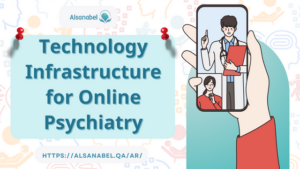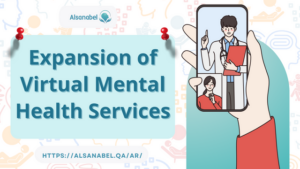Technology and Platforms for Online Psychiatry Service 2024
- Category best online psychiatry
Technology has revolutionized the way we access mental health services, making it easier than ever to prioritize our well-being. With a plethora of online psychiatric platforms available, finding the right one can seem daunting. However, armed with the latest data on the best Online Psychiatry Service, navigating this digital landscape becomes a breeze. Join us as we delve into the top platforms offering consultations, prescriptions, and medication management, empowering you to take charge of your mental health journey.
Technology Infrastructure for Online Psychiatry
Creating a technology infrastructure for online psychiatry involves several critical components:

- Telehealth Platform: Secure, HIPAA-compliant video conferencing. Integrated appointment scheduling and electronic health records (EHR). Mobile accessibility.
- Data Security and Compliance: Ensure HIPAA compliance, encryption, and regular security audits.
- Infrastructure and Hardware: Reliable high-speed internet, secure servers, cloud services, and backup systems.
- Software Tools: Practice management, prescription management, and diagnostic tools.
- Patient Experience: User-friendly interfaces, technical support, and accessibility features.
- Provider Tools and Training: Telehealth training, integration with clinical tools, and continuous education.
- Analytics and Reporting: Data analytics and reporting tools for tracking and improving services.
- Marketing and Outreach: Professional website, SEO, online advertising, and social media engagement.
- Support and Community Engagement: Online support groups and information on community resources.
- Feedback and Improvement: Collect patient feedback and implement quality improvement programs.
These components ensure a secure, reliable, and effective delivery of online psychiatric services.
Platforms for Online Psychiatry Service
Online psychiatry service offer accessible mental health care through various platforms. Here are some key options:
Key Platforms:
- BetterHelp: Counseling via messaging, live chat, phone, and video sessions with licensed therapists on a subscription basis.
- Talkspace: Therapy and psychiatry services with text, audio, and video messaging, multiple subscription plans, and insurance options.
- MDLIVE: On-demand psychiatry, therapy, and urgent care with medication management, accepting insurance.
- Amwell: 24/7 access to psychiatry and therapy with board-certified professionals, accepting insurance.
- Doctor on Demand: Comprehensive psychiatry, therapy, and primary care through video consultations with insurance coverage.
- Cerebral: Psychiatry and therapy with a focus on medication management and personalized care plans via monthly subscriptions.
- Regain: Specializes in relationship and couples therapy with messaging and live sessions.
- Brightside: Psychiatry and therapy for anxiety and depression with personalized treatment plans and progress tracking.
- Rethink My Healthcare: Affordable psychiatry and therapy services with telepsychiatry options.
- 7 Cups: Free peer support, affordable therapy, and counseling with anonymous communication.
- Lemonaid Health: Easy access to psychiatry and primary care with video consultations and straightforward pricing.
Choosing the Right Platform:
- Insurance: Ensure the platform accepts your insurance.
- Specialization: Choose based on specific mental health needs.
- Communication: Select preferred communication methods (video, chat, phone).
- Pricing: Compare subscription plans and costs.
- Availability: Consider platforms with 24/7 access for flexible scheduling.
These platforms provide convenient mental health care, aiding in effective management of conditions.
Psychiatrist Online Appointment and Assessment Tools
Effective online psychiatry service requires robust appointment and assessment tools, including:
- Online Appointment Tools: Scheduling software (e.g., Calendly, Acuity). Automated reminders and telehealth integration. Secure patient portals for managing appointments.
- Electronic Health Records (EHR) Systems: Integrated scheduling, patient records, and telehealth services. Patient access to health records and treatment plans.
- Assessment Tools: Standardized psychological assessments (e.g., PHQ-9, GAD-7). Automated scoring and real-time reporting.
- Telepsychiatry Platforms: HIPAA-compliant video conferencing (e.g., VSee, Amwell). Integrated assessment capabilities.
- Prescription Management: E-prescribing tools (e.g., DrFirst, Surescripts). Medication management and tracking.
- Communication Tools: Secure messaging apps for patient-provider communication. Tools for virtual check-ins.
- Patient Monitoring: Remote monitoring devices and self-reporting tools for symptoms and adherence.
- Analytics and Reporting: Data analytics for trends and treatment efficacy. Customizable patient and aggregate reports.
- Training and Support: Provider training resources and technical support.
- Compliance and Security: Ensure HIPAA compliance and data encryption for security.
These tools ensure efficient, secure, and effective online psychiatric care.
Technology Trends in Online Psychiatry
Technology trends in online psychiatry are evolving rapidly, enhancing the accessibility, effectiveness, and personalization of mental health care. Here are some key trends:
- Telehealth Expansion: Increased adoption and regulatory support for telepsychiatry, making it more mainstream and accessible.
- Artificial Intelligence (AI) and Machine Learning:
- Chatbots: Provide initial assessments and support.
- Predictive Analytics: Personalize treatment plans and predict mental health crises.
- Wearable Technology:
- Health Monitoring: Track physiological data like heart rate and sleep patterns.
- Biofeedback: Real-time stress and anxiety management.
- Mobile Apps:
- Therapeutic Support: Offer CBT, mindfulness, and mood tracking.
- Medication Management: Reminders and adherence tracking.
- Virtual Reality (VR):
- Exposure Therapy: Treat phobias, PTSD, and anxiety.
- Immersive Relaxation: Provide stress and anxiety relief.
- Data Security and Privacy:
- Enhanced Encryption: Protect patient information.
- HIPAA Compliance: Ensure privacy regulation adherence.
- Integration with Electronic Health Records (EHRs):
- Seamless Data Sharing: Provide comprehensive patient data.
- Coordinated Care: Improve collaboration among healthcare providers.
- Personalization and Precision Medicine:
- Genomic Data: Tailor treatments based on genetics.
- Personalized Therapy: Customize therapeutic approaches.
- Gamification:
- Engagement: Increase patient participation in therapy.
- Therapeutic Games: Improve cognitive function and well-being.
- Remote Patient Monitoring:
- Continuous Monitoring: Real-time tracking of mental health.
- Crisis Intervention: Alert providers to potential crises.
- Natural Language Processing (NLP):
- Text Analysis: Improve therapy through session transcript analysis.
- Sentiment Analysis: Tailor interventions based on patient emotions.
These trends are revolutionizing best online psychiatry, making mental health care more accessible, personalized, and effective. As technology advances, online psychiatry will continue to evolve, offering innovative solutions to meet the growing demand for mental health services.
Expansion of Virtual Mental Health Services
Expanding best online psychiatry services involves several strategic steps to enhance accessibility, quality, and reach of these services. Here are key considerations:

- Increase Accessibility: Expand to underserved areas, offer multi-language support, ensure 24/7 availability, and enhance mobile accessibility.
- Technology Enhancement: Integrate platforms with healthcare systems, use AI-driven chatbots, and employ wearable technology for monitoring.
- Service Diversification: Provide specialized programs, virtual group therapy, and preventive mental health services.
- Provider Training and Support: Offer telehealth training, continuous education, and support networks for providers.
- Quality Assurance: Develop standardized protocols, collect patient feedback, and track performance metrics.
- Data Security and Privacy: Implement advanced security measures, ensure compliance, and conduct regular audits.
- Partnerships and Collaboration: Collaborate with healthcare providers, community organizations, employers, and schools.
- Public Awareness and Outreach: Launch awareness campaigns, engage on social media, and conduct online workshops.
- Financial Accessibility: Advocate for insurance coverage, offer sliding scale fees, and seek funding.
- Innovation and Research: Invest in telehealth research, implement pilot programs, and establish a feedback loop for improvement.
These strategies will help expand and enhance virtual mental health services to meet growing demand and provide comprehensive care.
Thank you for reading our in-depth look at technology and platforms for online psychiatry services. We hope you found the information valuable and insightful. If you have any questions or would like to share your own experiences with online psychiatry services, please feel free to leave a comment. Your feedback is important to us as we continue to explore the intersection of technology and mental health care. Thank you for joining us on this journey.









